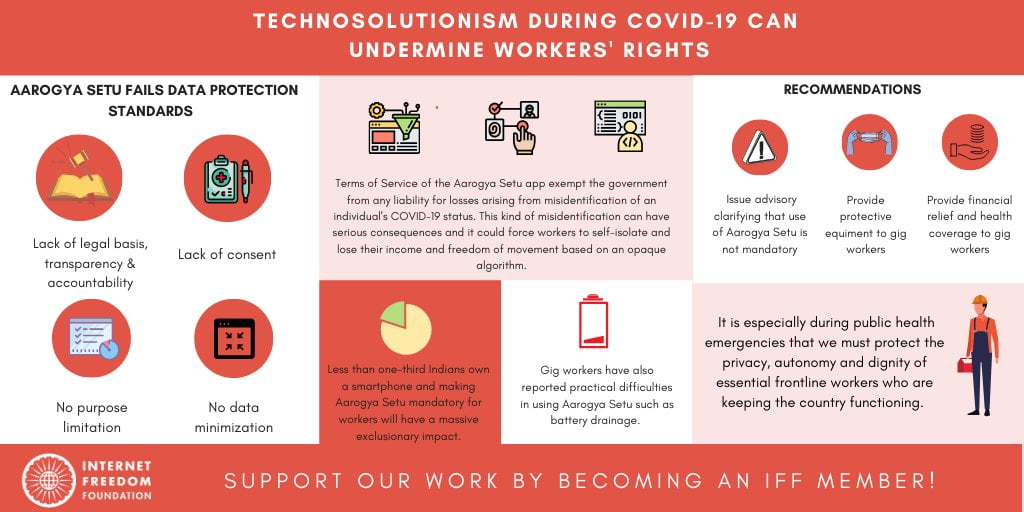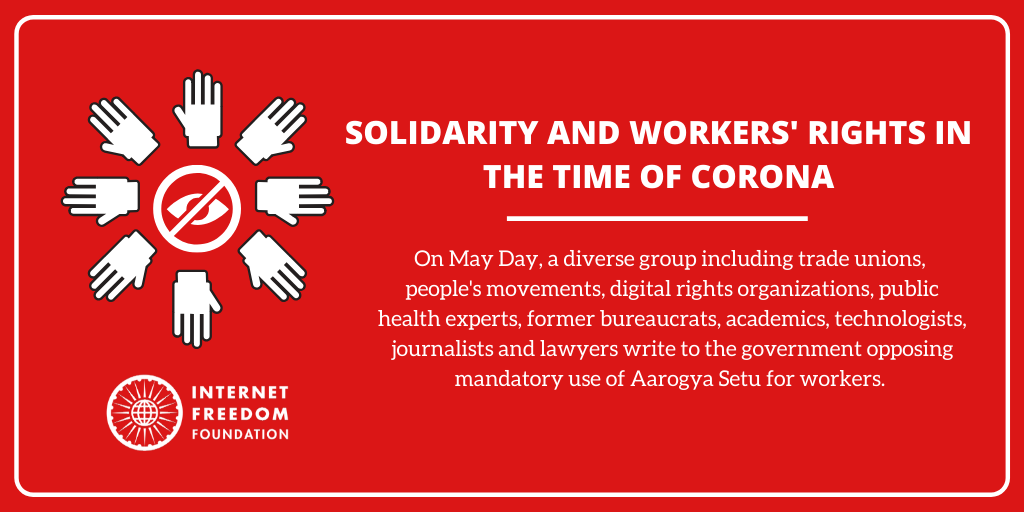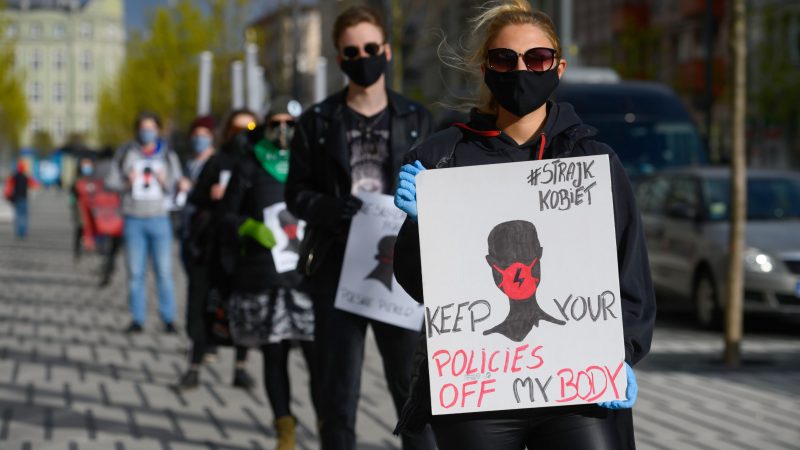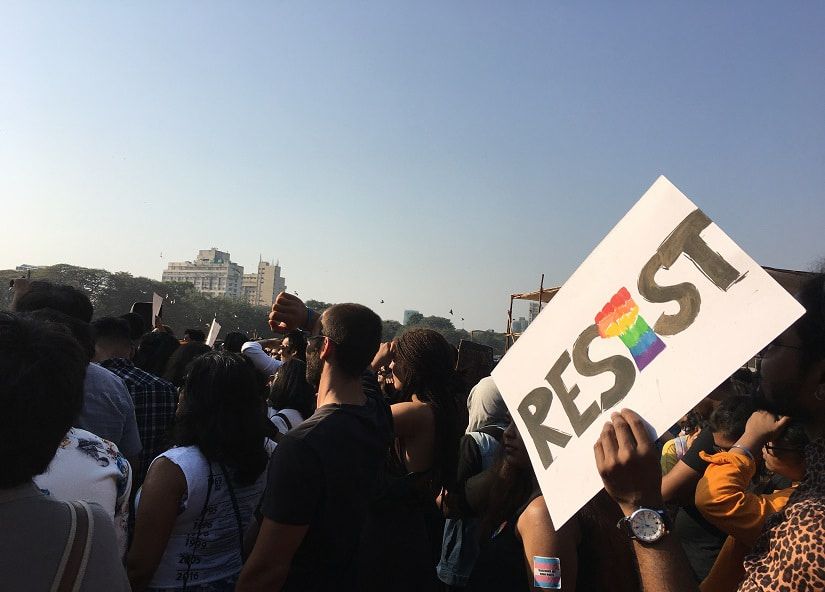Tl;dr
A diverse group of organisations and individuals have endorsed a representation to the Prime Minister’s Office and various central government ministries on May Day opposing mandatory use of Aarogya Setu. This is specifically focussed for workers during the COVID-19 outbreak. The Aarogya Setu app which was initially touted as a voluntary measure has effectively been made mandatory for gig workers and government employees. This is despite failing to adhere to data protection standards and lacking algorithmic accountability. Today, an important joint representation signed by 37 organisations including labour unions, and 75 prominent individuals have endorsed a joint representation urging the government to issue an advisory clarifying that use of Aarogya Setu cannot be made mandatory and also recommends financial relief, protective equipment and healthcare coverage for gig workers during the COVID-19 related lockdown.
Schrödinger’s App: Voluntary but also Mandatory!
On 02 April 2020, the government launched a contact tracing app (which now is building even an e-pass functionality) called Aarogya Setu which has been heavily criticised for failing to adhere to data protection principles of lawfulness, consent, purpose limitation, data minimisation, transparency and accountability. IFF has previously published a working paper which explains the problems with Aarogya Setu in great detail and you can read about it here. This working paper is being updated to account for subsequent changes but its fundamental concerns and recommendations about the problematic nature of Aarogya Setu remain valid.
While there were initial assurances that use of Aarogya Setu is voluntary, it was soon made compulsory for employees of Prasar Bharati and Central Armed Police Forces. However, even the army seems to have data security concerns about Aarogya Setu and it has instructed its officers to not use the app at work. Since this representation was drafted and circulated, the government has made Aarogya Setu mandatory for all central government employees and reports suggest that it may soon be pre-installed on all new smartphones.
In addition to government employees, certain private companies in the gig economy have also made Aarogya Setu mandatory for their workers. As lockdown restrictions are eased and business operations resume, other employers in the gig economy as well as the traditional economy may make use of the app compulsory for workers. Reports suggest that mandating use of Aarogya Setu may be a pre-emptive liability reduction measure by companies through draft guidelines for e-commerce which were privately circulated by the government mandate use of the app by all workers and hold the COO responsible for any violation.

Impact on Gig Workers
The Terms of Service of the Aarogya Setu app exempt the government from any liability for losses arising from misidentification of an individual’s COVID-19 status. This means that there is no remedy available if the app misidentifies a person as at risk of having COVID-19. This kind of misidentification can have serious consequences and it could force workers to self-isolate and lose their income and freedom of movement based on an opaque algorithm. Further, in the long term, Aarogya Setu could become a tool of mass surveillance and sensitive health and location data of workers could be used by law enforcement agencies for punitive purposes.
In addition to this, timely, important research done by Tandem Research and CIS, has demonstrated the need for government to provide financial relief, protective equipment and healthcare coverage to gig workers who are struggling to make ends meet during the lockdown and face higher risk of contracting COVID-19 due to exposure to multiple customers everyday. In light of these concerns, we have sought to support the rights of gig workers, a number which grows each day with greater adoption of smartphones across the country.
Joint Representation to the Government
Today, with the endorsement of 37 organisations and 75 individuals (till now), a joint representation will be sent at 7:00 PM to the Prime Minister’s Office and the Ministries of Electronics & IT, Labour, Home Affairs and Transport. The representation urges the issuance of an advisory to clarify that Aarogya Setu cannot be made mandatory for workers in the gig economy as well as the traditional economy. To quote from it:
“Considering the damaging impact of the Aarogya Setu app and COVID-19 lockdown on the privacy, autonomy and dignity of workers, we urge your office to undertake the below mentioned measures in collaboration with the private sector.
(a) Take cognizance of privacy concerns associated with Aarogya Setu and issue an advisory clarifying that use of the app should not be made mandatory for workers in the gig economy and also the traditional economy.
(b) In addition to (a), to ensure greater safety, rely on certain methods of risk mitigation such as working with companies to provide daily temperature checks and personal protective equipment to all gig and platform workers who continue working during the COVID-19 pandemic.
(c) Further, devise the right incentive structures both for companies and workers to ensure that gig and platform workers are able to sustain themselves during the lockdown and those displaying symptoms of COVID-19 are not forced to work to ensure their livelihood. This includes provisions for medical insurance and financial relief to all gig and platform workers who have been unable to work during the lockdown or have witnessed a significant decrease in earnings due to low demand.”
A copy of the representation can be found here (English | Hindi). As stated before, the representation has so far been endorsed by 37 organisations and 75 individuals.
It is open for public endorsement till 7:00 PM today and you can endorse it by sending an email to policy@internetfreedom.in with the line, “I endorse the Representation against Mandatory Use of Aarogya Setu to protect privacy, autonomy and dignity of workers during COVID-19 outbreak.” Please mention your name and profession/organizational affiliation in the email. If you wish to endorse organisationally, we urge you to kindly send it from your organisation’s official email account as far as possible.
List of existing signatories (Organisations and Individuals)
At present, the joint representation has been endorsed by a wide variety of organisations and individuals including trade unions, people’s movements, digital rights organisations, public health experts, former civil servants and bureaucrats, activists, academics, technologists, journalists, lawyers etc. The list of endorsees will be updated at 7:00 PM today before sending it to the government. The list of all existing endorsees is provided here.
We earnestly share the hope of all these signatories for a positive governmental response. This May Day, it is crucial for the government to recognize that it is especially during public health emergencies that we must protect the privacy, autonomy and dignity of essential frontline workers who are keeping the country functioning, healthy and well fed.
We intend to follow this up with broader public advocacy efforts and are open to offers of collaboration – for instance making pamphlets or a ‘jan parcha‘ on Aarogya Setu for workers in local vernacular. If you would like to volunteer, please do join the Internet Freedom Forum where such projects can be pitched and discussed with our staff and community organically.
Once again, endorsement is open till 7:00 PM by sending an email to policy@internetfreedom.in. Workers of the digital world unite!
Important Documents
- Joint Representation dated 01.05.2020 sent to PMO’s Office (English | Hindi)
- Comparative Analysis of Aarogya Setu (link)
- Working Paper on Privacy Concerns on Technological Responses to COVID-19 in India (link)
Devdutta Mukhopadhyay is Associate Counsel at Internet Freedom Foundation. She tweets @Devdutta96.




